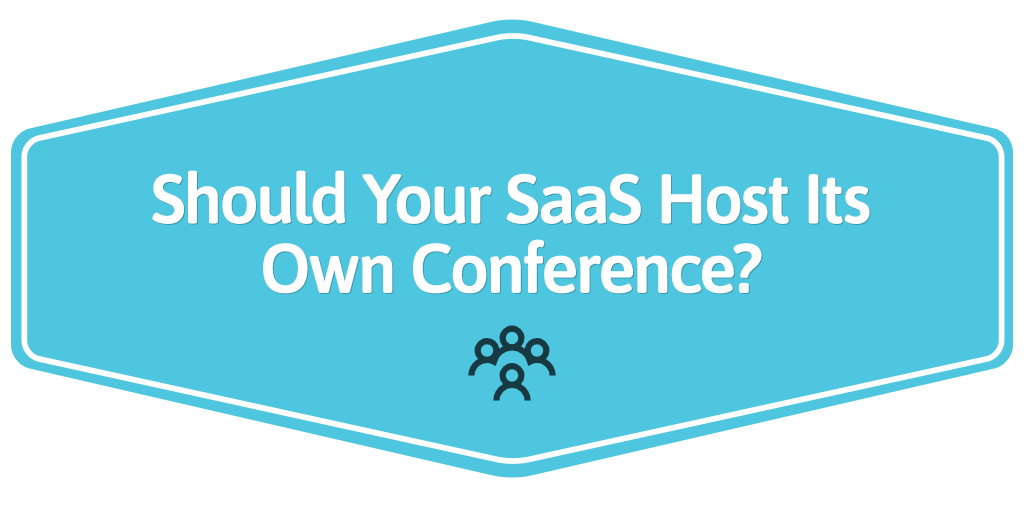
Hosting your own conference is no small undertaking. It requires you to develop the theme for the events, wrangle speakers, get attendees, organize logistics, book a space, plan the parties, and ten thousand other small details. If you’ve ever been to a great conference, the reason it was so great was because so much attention was put into every single small decision.
Despite the investment, hosting your own conference – especially as a SaaS company – can be wonderfully rewarding. It can close new deals and bring in new clients while helping you retain customers and build stronger relationships with the people who support your business.
With such a big up-front investment required, yet such a tantalizing reward at the end of the tunnel, the question becomes: should your company host its own conference? You’re about to find out.
You Should Host Your Own Conference If…

You Need to Get Face Time With Important Customers
Aside from the last 100 years of commerce, business has traditionally been done in person. Whether it was buying a loaf of bread at a local bakery or buying textiles from the mill, it was done face-to-face. However, with the spread of technology, the Internet, and the advent of SaaS business models, this type of commerce has become much less common. While that’s great news for the budget-conscious, it overlooks the fact that having in-person conversations can make all the difference when retaining customers.
You Want to Connect Customers to Each Other
A great benefit of building a business that is focused on a specific niche is that your customers can benefit from knowing each other. Unfortunately, just as you don’t have frequent opportunities to meet customers face-to-face, many of your customers don’t have the opportunity to network with fellow companies in-person. Sure, things like LinkedIn and the occasional local city meetup can fill in the gaps, but it’s not a substitute for a dedicated opportunity to meet people. This may seem like a small reason to host a conference, but connecting your customers to each other at no cost can really underscore how valuable of a company you run.
You Have (a Lot of) New Things to Demo
Accurately explaining the intricacies of your product takes time and effort. It becomes even harder when you build new features for your customers or roll out completely new products. Typically, these types of new components call for a quick email announcement that glances over the value of the feature, which leads to confusion for customers.
This is where conferences can come in. For major new features, conferences and talks provide the perfect opportunity to not only pitch customers on the value of a new feature, but also demonstrate the value in real-time. This benefit becomes even stronger if you have a customer share how early access to the feature has changed their business. The classic example of this is Apple, which not only debuts new features and capabilities during keynote speeches, but also brings partners and customers up on stage to show how people can make the best use of the newly announced features.
You Should Stick to Your Computer If…

You Are Still Getting Off the Ground
The traditional view of conferences is that they are best suited for companies the size of Salesforce that can guarantee tens of thousands of attendees. While this isn’t true, there is something to be said for not hosting a conference until your business has some stability. This doesn’t mean that you need to wait until you list your company on the stock exchange to host a conference, but it does mean that you should invest your resources into the marketing tactics that will drive the most growth. Yes, conferences can be that driver, but that typically only happens once you have already seen some marketplace validation of what you’re doing. Otherwise, you’ll just end up sitting alone in a ballroom.
You Will Be the Only Speaker
Great conferences are built around a theme, not around a specific person. While making sure that your public talks are high quality is absolutely worth the investment, people will only attend if there are other speakers that can carry their own weight. This means that you’ll need invite other speakers from your industry and coach customers on how to address your audience.
One of the best ways to bring on other speakers is by bringing customers up on stage to talk about what they’re doing and how your products are helping them. Not only does it break up the monotony of listening to just one person, but it also helps promote your customers. This in turn leads to more successful customers, which benefits everyone involved.
You Don’t Think Customers Will Commit
The classic advantage of SaaS companies is that the business model has nothing to do with geographic location and everything to do with the quality and necessity of the software. This means you can reach any customer in the world and have contacts in every city, while avoiding the overhead of a local office. It’s great news for your business, but it can also mean that almost all of your customers will need to travel in order to attend a conference. If you’ve been around for a number of years and your customers are intensely loyal to you, this might not be an issue. However, if your customers aren’t fully bought into both your products and your way of doing business, you may find that people are unwilling to commit to a ticket.
Something To Think About
If you’re still on the fence about whether or not you should host a conference, there is one more thing you can think about. It doesn’t mean you should skip over the questions we outlined above, but it does help put things in perspective. If you’ve found that there are an equal number of positives and negatives to hosting a conference, host one anyway – but keep it small. You don’t need to have a conference the size of a Fortune 500 company to be a success. Instead, you can start small, evaluate what worked and what didn’t, and then either scale up the size of the next conference or call it off entirely.
